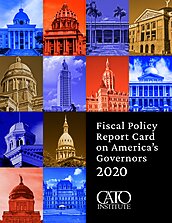That is the backdrop to this year’s 15th biennial fiscal report card on the governors, which examines state budget actions since 2018. It uses statistical data to grade the governors on their tax and spending records—governors who have restrained taxes and spending receive higher grades, while those who have substantially increased taxes and spending receive lower grades.
Four governors were awarded an A on this report: Chris Sununu of New Hampshire, Kim Reynolds of Iowa, Pete Ricketts of Nebraska, and Mark Gordon of Wyoming. Seven governors were awarded an F: Ralph Northam of Virginia, Andrew Cuomo of New York, Gretchen Whitmer of Michigan, Phil Murphy of New Jersey, J. B. Pritzker of Illinois, Kate Brown of Oregon, and Jay Inslee of Washington.
This report examines the widely varying tax and spending choices that governors have made in recent years. It discusses ways that states can respond to today’s budget challenges, including tapping revenues from marijuana legalization and cutting costs by prohibiting public-sector collective bargaining. The report also describes how states can prepare for future downturns by building large rainy day funds and creating stable and pro-growth tax bases.
With the 2020 health crisis and recession, governors across the nation are facing tough fiscal choices. However, the need for restraint and recovery provides an opportunity for governors to prune low-value spending from state budgets and to pursue growth-enhancing tax reforms.





